
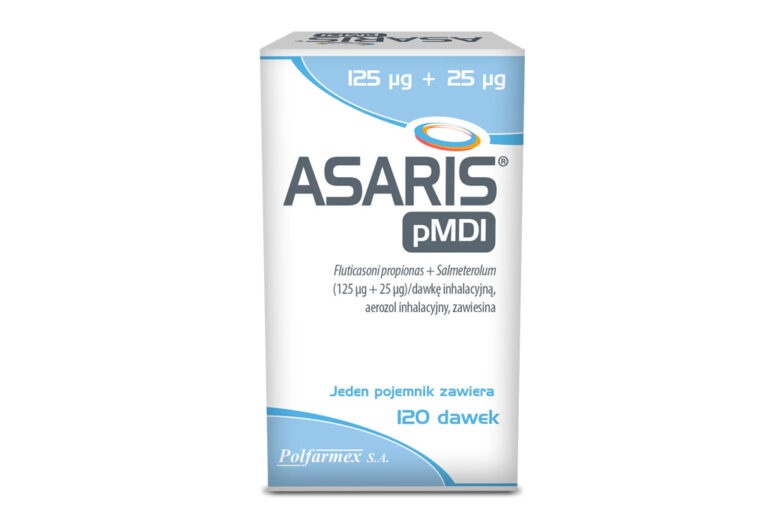
Asaris pmdi

Ask a doctor about a prescription for Asaris pmdi

How to use Asaris pmdi
Leaflet accompanying the packaging: patient information
ASARIS pMDI, (50 μg + 25 μg)/inhalation dose, inhalation aerosol, suspension
ASARIS pMDI, (125 μg + 25 μg)/inhalation dose, inhalation aerosol, suspension
ASARIS pMDI, (250 μg + 25 μg)/inhalation dose, inhalation aerosol, suspension
Fluticasone propionate + Salmeterol
You should carefully read the contents of the leaflet before using the medicine, as it contains important information for the patient.
- You should keep this leaflet, so that you can read it again if you need to.
- If you have any doubts, you should consult a doctor or pharmacist.
- This medicine has been prescribed specifically for you. Do not pass it on to others. The medicine may harm another person, even if their symptoms are the same.
- If the patient experiences any side effects, including any side effects not listed in this leaflet, they should tell their doctor or pharmacist. See section 4.
Table of contents of the leaflet:
- 1. What is ASARIS pMDI and what is it used for
- 2. Important information before using ASARIS pMDI
- 3. How to use ASARIS pMDI
- 4. Possible side effects
- 5. How to store ASARIS pMDI
- 6. Contents of the packaging and other information
1. What is ASARIS pMDI and what is it used for
ASARIS pMDI contains two active substances: salmeterol and fluticasone propionate.
- Salmeterol is a long-acting bronchodilator. Bronchodilators help maintain airway patency. This facilitates airflow to and from the lungs. The effect lasts for at least 12 hours.
- Fluticasone propionate is a corticosteroid that reduces swelling and irritation of the lungs.
The doctor has prescribed this medicine to the patient to prevent breathing disorders occurring in asthma. To ensure proper control of asthma, ASARIS pMDI must be used every day, as recommended by the doctor.
ASARIS pMDI prevents the occurrence of shortness of breath and wheezing in the airways. However, it should not be used to control sudden attacks of shortness of breath or wheezing in the airways. If such an attack occurs, it is necessary to use a rapidly acting inhalation bronchodilator, such as salbutamol. The patient should always have such a medicine with them.
The doctor will regularly check the patient's symptoms.
2. Important information before using ASARIS pMDI
When not to use ASARIS pMDI
- if the patient is allergic to salmeterol, fluticasone propionate, or norflurane (HFA-134a), an excipient of the medicine.
Warnings and precautions
Before starting to use ASARIS pMDI, the patient should discuss with their doctor if they have:
- heart disease, including irregular or rapid heartbeat,
- hyperthyroidism,
- high blood pressure,
- diabetes (ASARIS pMDI may increase blood glucose levels),
- low potassium levels in the blood,
- tuberculosis currently being treated or having been treated, or other lung infections.
If the patient experiences blurred vision or other vision disturbances, they should contact their doctor.
ASARIS pMDI and other medicines
The patient should tell their doctor about all medicines they are currently taking or have recently taken, as well as any medicines they plan to take, including asthma medicines and medicines available without a prescription. ASARIS pMDI should not be used with certain medicines. Before starting to use ASARIS pMDI, the patient should inform their doctor about the use of the following medicines:
- β-blockers (e.g., atenolol, propranolol, and sotalol). β-blockers are most commonly used to treat high blood pressure or other heart diseases.
- Medicines used to treat infections (e.g., ketoconazole, itraconazole, and erythromycin), including some medicines used to treat HIV (e.g., ritonavir, cobicistat-containing products). Some of these medicines may increase the levels of fluticasone propionate or salmeterol in the body. This may increase the risk of side effects, including irregular heartbeat or worsening of existing side effects. The doctor may want to closely monitor the patient's condition when taking such medicines.
- Corticosteroids (orally or by injection). If the patient has recently taken such medicines, it may increase the risk of adrenal gland disorders.
- Diuretics used to treat high blood pressure.
- Other bronchodilators (such as salbutamol).
- Medicines containing xanthine derivatives, often used to treat asthma.
Pregnancy and breastfeeding
If the patient is pregnant or breastfeeding, thinks they may be pregnant, or plans to have a child, they should consult their doctor before using this medicine. The doctor will assess whether the patient can take ASARIS pMDI during this period.
Driving and using machines
It is unlikely that ASARIS pMDI will affect the ability to drive and use machines.
3. How to use ASARIS pMDI
ASARIS pMDI should always be used as recommended by the doctor. If in doubt, the patient should consult their doctor or pharmacist.
- ASARIS pMDI should be used every day until the doctor recommends otherwise.
- The patient should not take a higher dose than recommended. If in doubt, they should consult their doctor or pharmacist.
The patient should not stop using ASARIS pMDI or reduce the dose without consulting their doctor.
- ASARIS pMDI should be inhaled into the lungs through the mouth.
Adults and adolescents from 12 years of age:
- ASARIS pMDI, (50 μg + 25 μg)/inhalation dose: two inhalations twice a day.
- ASARIS pMDI, (125 μg + 25 μg)/inhalation dose: two inhalations twice a day.
- ASARIS pMDI, (250 μg + 25 μg)/inhalation dose: two inhalations twice a day.
Children from 4 to 12 years of age:
- ASARIS pMDI, (50 μg + 25 μg)/inhalation dose: two inhalations twice a day.
- ASARIS pMDI is not recommended for use in children under 4 years of age.
If the patient's asthma symptoms are well-controlled while using ASARIS pMDI twice a day, the doctor may recommend reducing the frequency of ASARIS pMDI use to once a day. The dose can be given:
- once a day, in the evening, if the patient's symptoms occur at night,
- once a day, in the morning, if the patient's symptoms occur during the day.
It is very important that the doctor instructs the patient on how many inhalations of the medicine and how often to use it. If the patient is using ASARIS pMDI for asthma, the doctor will regularly check the patient's symptoms.
In case of worsening asthma symptoms or loss of asthma control, the patient should
contact their doctor immediately. There may be an increase in wheezing, more frequent chest tightness, or a need for a higher dose of a rapidly acting inhalation bronchodilator. In such a situation, the patient should continue using ASARIS pMDI, but not increase the number of inhalations. The patient's symptoms may worsen, and their condition may deteriorate. The patient should contact their doctor, as they may need additional treatment.
Instructions for using the inhaler
- The doctor, nurse, or pharmacist should instruct the patient on how to use the inhaler properly. They should periodically check that the patient is using the inhaler correctly. Using ASARIS pMDI contrary to the doctor's recommendation or improper use of the inhaler may cause the medicine to not produce the expected improvement in asthma.
- The medicine is placed in a pressure container, in a plastic housing with a mouthpiece.
Checking the inhaler
- 1. Before first use, the patient should check that the inhaler is working. The patient should remove the cap from the mouthpiece of the inhaler by gently pressing the sides of the cap with their thumb and index finger.
- 2. To ensure that the inhaler is working, the patient should shake the inhaler vigorously, point the mouthpiece away from them, and release two doses of the medicine into the air. If the inhaler has not been used for a week or longer, the patient should remove the cap from the mouthpiece, shake the inhaler vigorously, and release two doses of the medicine into the air.
Using the inhaler
It is essential to start breathing slowly, as slowly as possible, before using the inhaler.
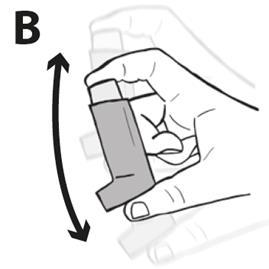
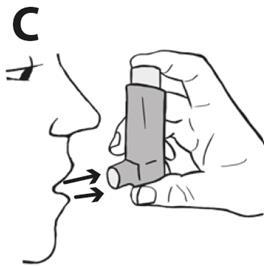
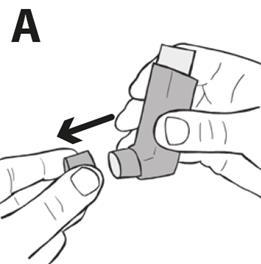
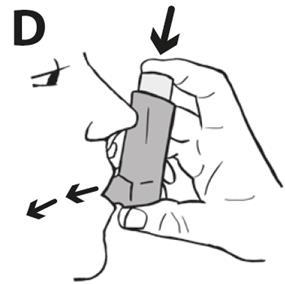
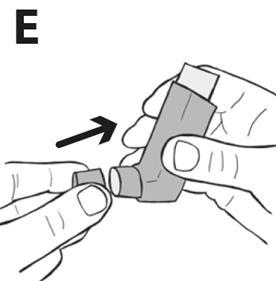
- 1. Inhalation should be performed standing or sitting.
- 2. The patient should remove the cap from the mouthpiece of the inhaler. The patient should check the mouthpiece outside and inside to ensure it is clean and free of foreign objects (Figure A).
- 3. The patient should shake the inhaler 4 or 5 times to ensure that any foreign objects have been removed and that the contents of the inhaler are evenly mixed (Figure B).
- 4. The patient should hold the inhaler upright with their fingers, with their thumb on the base of the inhaler, under the mouthpiece. The patient should take a deep breath, as deep as possible (Figure C).
- 5. The patient should put the mouthpiece in their mouth and seal it with their lips. The patient should not bite the mouthpiece.
- 6. The patient should start a slow and deep inhalation. Immediately after starting inhalation through the mouth, the patient should press the inhaler to release a dose of ASARIS pMDI, and then continue with a calm, deep inhalation (Figure D).
- 7. The patient should hold their breath, remove the inhaler from their mouth, and take their finger off the inhaler. The patient should hold their breath for a few seconds or as long as it is comfortable, and then exhale slowly.
- 8. If the doctor has recommended two inhalations of the medicine, the patient should wait about half a minute before repeating the steps described in points 3-7.
- 9. Rinsing the mouth with water and spitting it out and (or) brushing the teeth after inhalation can help prevent hoarseness and thrush.
- 10. After inhalation, the patient should always put the cap back on the mouthpiece to prevent dust from entering it (Figure E). The patient should put the cap back on by clicking it into place. If the cap does not click into place when put back, the patient should remove it, turn it around, and try again. The patient should not use too much force.
The patient should not rush through the steps described in points 4, 5, 6, and 7. It is essential to breathe as slowly as possible before inhalation. To ensure that the inhalation is performed correctly, the patient should initially check their technique in front of a mirror. The "mist" coming out of the inhaler, mouth, or nose during inhalation indicates incorrect inhalation technique. The patient should repeat the steps starting from point 3. As with all inhalers, caregivers should ensure that children who have been prescribed ASARIS pMDI use the inhaler correctly, as described above. If the patient has difficulty coordinating their breath and inhalation from the inhaler, they may be advised to use an inhaler with a spacer. The doctor, nurse, or pharmacist should instruct the patient on how to use the inhaler with a spacer and how to care for the spacer, and answer any questions the patient may have. If the patient uses a spacer, it is essential not to stop using it without consulting their doctor or nurse. It is also crucial not to change the type of spacer without consulting their doctor. If the patient stops using the spacer or changes its type, the doctor may decide to change the dose of the medicine needed to control asthma symptoms. The patient should always consult their doctor before making any changes to their asthma treatment. Older children or people with weak hands may find it easier to hold the inhaler with both hands. The patient should hold the inhaler with two index fingers on top of the inhaler and both thumbs on the bottom, below the mouthpiece.
Cleaning the inhaler
To prevent the inhaler from clogging, it should be cleaned at least once a week. To clean the inhaler:
- The patient should remove the cap from the mouthpiece.
- The patient should not remove the metal container from the plastic housing during cleaning or at any other time.
- The patient should clean the mouthpiece inside and outside and the plastic housing outside with a dry cloth or tissue.
- The patient should put the cap back on the mouthpiece. When the cap is put back correctly, it will click into place. If the cap does not click into place when put back, the patient should remove it, turn it around, and try again. The patient should not use too much force.
The patient should not immerse the metal container in water.
Using a higher than recommended dose of ASARIS pMDI
It is essential to use the inhaler as instructed. If the patient has accidentally used a higher dose than recommended, they should tell their doctor or pharmacist. The patient may experience:
- rapid heartbeat,
- tremors,
- dizziness,
- headache,
- muscle weakness, and
- joint pain.
If the patient uses higher doses for an extended period, they should consult their doctor or pharmacist for advice, as high doses of ASARIS pMDI may cause a decrease in the production of steroid hormones by the adrenal glands. In case of further doubts about using this medicine, the patient should consult their doctor, nurse, or pharmacist.
4. Possible side effects
Like all medicines, ASARIS pMDI can cause side effects, although not everybody gets them. To minimize the risk of side effects, the doctor will recommend the lowest dose of ASARIS pMDI that will control the patient's asthma.
Allergic reactions: The patient may experience sudden breathing difficulties immediately after using ASARIS pMDI.
The patient may experience an increase in wheezing, coughing, or shortness of breath, as well as itching, rash (hives), and swelling (usually of the face, lips, tongue, or throat). The patient may also experience a feeling of a very rapid heartbeat, weakness, or dizziness (which can lead to falls or loss of consciousness). If the patient experiences any of these symptoms soon after using ASARIS pMDI, they should stop using ASARIS pMDI and contact their doctor immediately. Allergic reactions to ASARIS pMDI are uncommon (they may occur in 1 to 10 out of 1,000 patients taking the medicine). Other side effects:
- Very common side effects(may occur in more than 1 in 10 patients):
- Headache - this side effect usually decreases over time while continuing treatment.
- Increased frequency of colds in patients with COPD.
Common side effects(may occur in 1 to 10 out of 100 patients):
- Thrush (painful, creamy-white patches) in the mouth and throat, as well as tongue pain, hoarseness, and throat irritation. Rinsing the mouth with water and spitting it out and (or) brushing the teeth after each inhalation can be helpful. The doctor may recommend an antifungal medicine to treat thrush.
- Pain, swelling of the joints, and muscle pain.
- Muscle cramps.
The following side effects have been reported in patients with chronic obstructive pulmonary disease (COPD):
- Pneumonia (lung infection). The patient should tell their doctor if they experience any of the following symptoms while using ASARIS pMDI - these may be symptoms of a lung infection: fever or chills, increased production of mucus, change in mucus color, worsening cough
or increased difficulty breathing.
- Easier bruising and fractures.
- Sinusitis (feeling of tension and fullness in the nose, cheeks, and behind the eyes, sometimes with a pulsating headache).
- Decreased potassium levels in the blood (the patient may experience irregular heartbeat, muscle weakness, or cramps).
Uncommon side effects(may occur in 1 to 10 out of 1,000 patients):
- Increased blood sugar (glucose) levels (hyperglycemia). In patients with diabetes, it may be necessary to monitor blood sugar levels more frequently and adjust the dose of antidiabetic medicines being taken.
- Cataract (clouding of the lens of the eye).
- Very rapid heartbeat (tachycardia).
- Feeling of trembling and rapid or irregular heartbeat (palpitations) - these symptoms usually are not serious and decrease over time while continuing treatment.
- Atrial fibrillation.
- Ischaemic heart disease, the symptoms of which are: chest pain and feeling of pressure in the chest, shortness of breath.
- Sleep disturbances.
- Restlessness.
- Allergic skin rash.
Rare side effects(may occur in 1 to 10 out of 10,000 patients):
- Wheezing or breathing difficulties worsening immediately after taking ASARIS pMDI.If such symptoms occur, the patient should stop using ASARIS pMDI, use a rapidly acting inhalation bronchodilator, and contact their doctor immediately.
- ASARIS pMDI may disrupt the normal production of steroid hormones by the body, especially when taking high doses of the medicine for a long time. These symptoms include:
- slow growth in children and adolescents,
- decreased bone density,
- glaucoma,
- weight gain,
- moon face (Cushing's syndrome). The doctor will regularly check if the patient is experiencing such side effects and ensure that the patient is using the lowest dose of ASARIS pMDI that will control their asthma.
- Changes in behavior, such as excessive excitement and irritability (these symptoms occur mainly in children).
- Irregular heartbeat or extra heartbeats (heart rhythm disorders). The patient should inform their doctor about this, but should not stop using ASARIS pMDI unless the doctor recommends it.
- Fungal infection of the esophagus, which can cause difficulty swallowing.
Side effects with unknown frequency(frequency cannot be estimated from the available data):
- Depression or aggression. The occurrence of these side effects is more likely in children.
- Blurred vision.
Reporting side effects
If the patient experiences any side effects, including any side effects not listed in this leaflet, they should tell their doctor or pharmacist, or nurse. Side effects can be reported directly to the Department of Drug Safety Monitoring of the Office for Registration of Medicinal Products, Medical Devices, and Biocidal Products: Al. Jerozolimskie 181C, 02-222 Warsaw, Tel.: +48 22 49 21 301, Fax: +48 22 49 21 309, website: https://smz.ezdrowie.gov.pl. Side effects can also be reported to the marketing authorization holder or its representative. By reporting side effects, more information can be gathered on the safety of the medicine.
5. How to store ASARIS pMDI
- The medicine should be stored out of the sight and reach of children.
- The patient should not use ASARIS pMDI after the expiry date stated on the packaging. The expiry date (EXP) is the last day of the month stated. The batch number is abbreviated as Lot.
- The patient should store ASARIS pMDI at a temperature below 25°C.
- Like most inhalation medicines in pressure containers, the therapeutic effect of this medicine may decrease when the container is cold.
- The metal container contains a suspension under pressure. The patient should not expose it to temperatures above 50°C, protect it from direct sunlight, and not pierce or burn the container, even if it seems empty.
- Medicines should not be disposed of via wastewater or household waste. The patient should ask their pharmacist how to dispose of medicines that are no longer needed. This will help protect the environment.
6. Contents of the packaging and other information
What ASARIS pMDI contains
- The active substances of the medicine are salmeterol and fluticasone propionate. Each measured dose contains 50, 125, or 250 μg (micrograms) of fluticasone propionate and 25 μg (micrograms) of salmeterol (as salmeterol xinafoate).
- The other ingredient is norflurane, HFA-134a.
This medicine contains fluorinated greenhouse gases. Each inhaler contains 11.2 g of HFA-134a (norflurane), which is equivalent to 0.0160 tons of CO2 equivalent (GWP = 1430).
What ASARIS pMDI looks like and what the packaging contains
- ASARIS pMDI is supplied in an inhaler containing the medicine as a pressurized suspension for inhalation through the mouth into the lungs.
- The container under pressure contains a homogeneous (uniform) suspension for inhalation.
- Packaging:Aluminum container with a metering valve, mouthpiece with PP, and closure with PP, all in a cardboard box. One pressure container contains 120 doses.
Marketing authorization holder and manufacturer:
Polfarmex S.A., ul. Józefów 9, 99-300 Kutno, Poland, Tel.: +48 24 357 44 44, Fax: +48 24 357 45 45, e-mail: [email protected]
Manufacturer:
Genetic S.p.A., Contrada Canfora, 84084 Fisciano (SA), Italy, Date of last revision of the leaflet:January 2025
- Country of registration
- Active substance
- Prescription requiredYes
- Manufacturer
- ImporterGenetic S.p.A Polfarmex S.A.
- This information is for reference only and does not constitute medical advice. Always consult a licensed doctor before taking any medication. Oladoctor is not responsible for medical decisions based on this content.
- Alternatives to Asaris pmdiDosage form: Powder, 50 mcg + 250 mcgActive substance: salmeterol and fluticasoneManufacturer: Aeropharm GmbHPrescription requiredDosage form: Powder, 50 mcg + 500 mcgActive substance: salmeterol and fluticasoneManufacturer: Aeropharm GmbHPrescription requiredDosage form: Powder, (50 micrograms + 500 micrograms)/doseActive substance: salmeterol and fluticasonePrescription required
Alternatives to Asaris pmdi in other countries
The best alternatives with the same active ingredient and therapeutic effect.
Alternative to Asaris pmdi in España
Alternative to Asaris pmdi in Ucrania
Online doctors for Asaris pmdi
Discuss dosage, side effects, interactions, contraindications, and prescription renewal for Asaris pmdi – subject to medical assessment and local rules.














